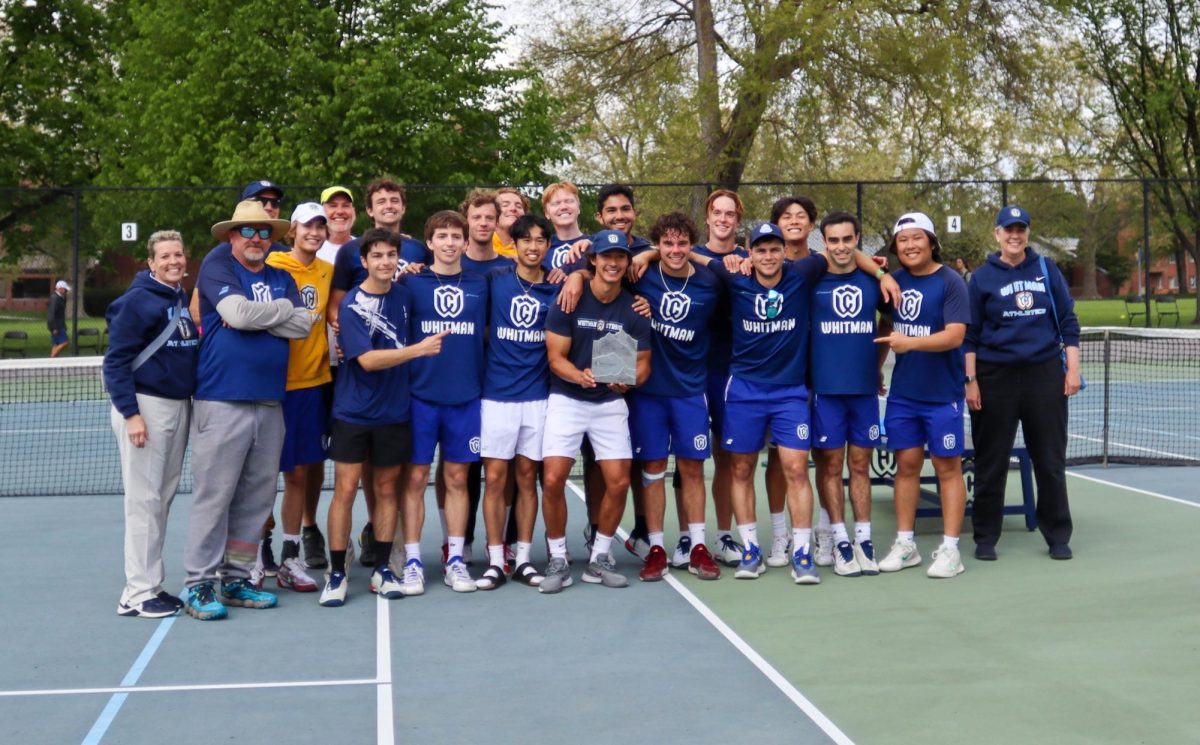Whitman tennis found their first competition of the year at the ITA Northwest Regional Championships. The men’s team played Sept. 21-23 at Linfield College in McMinnville, Ore.; the women competed Sept. 28-30 at Willamette College in Salem, Ore. The rosters of both teams have undergone significant changes since last year.
With the loss of graduating seniors and team leaders Phalkun Mam, Steven Ly and Robert Munday last year, expectations for the men’s 2008 season were unsure.
“I think a lot of schools underestimated us at the tournament,” said sophomore Matt Solomon. “They didn’t take us as seriously because we’d lost some of our top players.”
Solomon placed first at the tournament in the singles division, defeating first-year teammate Chris Bailey 7-5, 6-2 in the finals. Solomon and first-year Etienne Moschevich were the tournament’s top seeds in doubles and won 9-8 to teammates Nadeem Kassam and Jake Cappel, both sophomores.
“We really proved ourselves at Linfield,” said Solomon. “We had 12 players in the final 16, seven in the final eight and four in the semifinals. We were prepared and confident: all our hard work paid off.”
Sophomore Jasper Follows also noted that the team’s increased practices and conditioning was evident at the competition.
“We’ve been training three hours per day, including a doubles league where teammates play against each other,” said Follows. “I think that paid off a lot in terms of mental toughness. By playing each other we’ve grown as a team.” Follows made the quarterfinals in singles and beat No. 5 seed Kyle Anderson from Linfield.
“Most of us had to play teammates at the tournament because everyone did so well,” said Moschevich. “The atmosphere was great: everyone is supportive. We’re a really close team.” Both Solomon and Moschevich will go on to play at the ITA Small College Championships at Mobile, Ala., in October.
Solomon, Moschevich and Follows all agreed that new team leaders haven’t emerged to replace last year’s seniors, but that shouldn’t be a problem.
“We’re a very young team : there’s only one junior and one senior in our top 10 players,” said Follows. “We feed off each other.”
“There’s less team leadership from an individual, because the entire team has risen to that responsibility,” said Solomon. “We’re pushing each other a lot more than we did last year. We’re growing into leaders as a team and I think that will really pay off in the regular season.”
The women’s team also experienced new leadership this year in their new coach, Hannah Swee. Swee had been the team’s assistant coach since she graduated from Whitman in May 2005.
“There actually isn’t a lot of difference with Hannah as our coach,” said sophomore Hadley DeBree. “She played under our old coach when she went to Whitman, so the practices and approach are similar.”
The women’s team this fall consists of only four players: three sophomores and one first-year: because three juniors are abroad and one incoming student deferred until next semester.
“Having such a small team is great in one sense because it’s harder to slack off. You really need to push yourself at every practice, otherwise it’s pretty obvious,” said first-year Elise Otto. “On the other hand, if someone gets injured during the season, it’s going to hurt us.” Six players is the minimum requirement for competition as a team; Whitman will have eight players during the spring season.
Otto and sophomore Margo Lentz lost 8-3 in the semifinals to Kasey Kuenzli and Sallie Katter from Linfield. Otto also made the semifinals in the singles division before dropping a 6-2, 6-2 match to Lewis and Clark first-year Amalia Nilsson. DeBree and sophomore Divneet Kaur were the No. 5 seeds in doubles and lost 8-3 in the quarterfinals to Nilsson and Lisa Harunaga.
“Nilsson is a really good player,” said DeBree. “That was a bit of a surprise, because Lewis and Clark hasn’t been a big competitor in recent years.”
Players on both the men’s and women’s teams described the teams as close-knit and supportive and are optimistic about the spring season.
“There’s room for improvement, but I think there’s many more successes to come,” said Moschevich. “This is just the beginning.”


